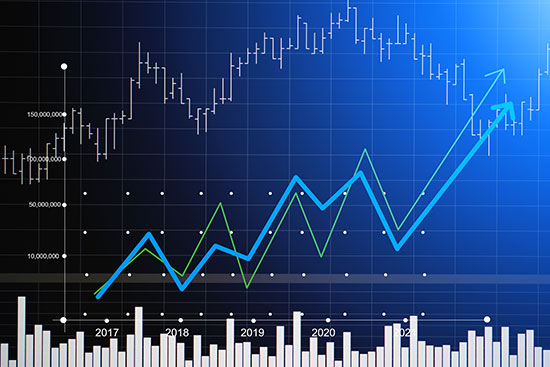忘了去年12月吧,歷史告訴我們美股漲勢將延續到圣誕節后

|
2019年的美國股市極其火爆。截至10月25日,標普500指數上漲逾23%。2018年年底美股曾經下跌近20%,后在圣誕前夜觸底,進而推動了今年的行情。 去年的美國股市也曾經表現強勁,但在年底前功盡棄,這讓許多投資者擔心今年又要出現上演類似的戲碼。實際上,《巴倫》周刊最新的大資金調查顯示,只有27%的基金經理看好美股未來12個月的走勢,這是20多年來看漲人數最少的一次。幾乎三分之一的受訪職業經理人都自視為看空派。 歷史讓我們看到,股市往往會遵循牛頓的理論,一直保持原有的運動方向。今年1至9月,標普500指數上漲近21%。這樣的行情實際上比大家所認為的還要正常。從1926年算起,標普指數在前三個季度走出兩位數漲幅的情況一共出現了42次(包括今年)。也就是說,在這些自然年中,投資者在第四季度前獲得兩位數回報的年份幾乎占了一半。 那么這樣的行情延續到年底的有多少次呢? 這個數字實際上高的讓人驚訝。此前標普500指數截至9月30日的漲幅達到兩位數的年份有41個,而第四季度該指數繼續上漲的有35次,而且其中29次都上揚了3%或更高。在這35個年頭中,標普指數在第四季度平均上漲了3%左右。1926年以來,該指數前三季度漲幅達到或超過20%的有23年,而這23年中美股在第四季度告跌的只有3次。 但這里要說明一下。歷史上股市的慣性效應一直很強,但反轉也會很劇烈。在前三個季度實現兩位數收益的年份中,美股在第四季度下跌的有6次,而這6次中市場跌幅達到兩位數的有3次。 去年,前期大漲的標普500指數在第四季度下跌近14%,是超級反轉中的一次。另外兩個以動量崩盤收場的年份分別是1929年和1987年。1929年1至9月美股漲幅幾乎達到27%,但在當年最后三個月,隨著大蕭條開始橫掃一切,美股也出現了28%的跌幅。 1987年標普500指數如同炮彈出膛,到9月底時上漲了36%。但在10月,美股出現了歷史最大的單日跌幅。當年年底該指數幾乎下跌了23%,其中很大一部分跌幅出現在那個黑色星期一。 因此,就今年到目前為止的美妙行情來說,既有好消息,也有壞消息。好消息是前三季度大幅上漲后,絕大多數時候美股都在剩下的時間里再次出現高于平均水平的增長。應該把上漲作為基準預期,因為它占的比例為85%。但市場數據還摻雜了異常值,所以壞消息就是大漲之后市場也可能因為動量崩盤而大跌。 這實際上就是股市自身走勢的縮影。大多數情況下它都在上漲,而且往往會大幅攀升。但有時它也會下跌,并且是急劇滑落。歷史上的那些暴跌都在大漲之后的很短一段時間內出現。 這種《化身博士》般的表現是股市長期預測回報率高于其他金融資產的原因之一。如果不是給大跌創造機會,股市也就不會有這些大漲行情。(財富中文網) 本文作者是注冊金融分析師本·卡爾森(Ben Carlson),他是里薩茲財富管理公司(Ritholtz Wealth Management)機構資產管理部門的主任。 譯者:Charlie 審校:夏林 |
The stock market is enjoying a rollicking 2019. Through the week ending October 25th, the S&P 500 was up more than 23%. These gains are aided by the fact that stocks fell nearly 20% at the end of 2018 and bottomed out on Christmas Eve of last year. Last year saw a fierce rally trip all over itself to end the year which makes many investors nervous that we're setting up for another leg down this year in a similar fashion. In fact, according to the most recent Barron's Big Money Poll, only 27% of money managers are bullish on the market's prospects over the next 12 months, the lowest reading in more than 20 years. Almost one-third of professional managers surveyed for this poll consider themselves bearish. History shows us stock markets tend to follow Sir Issac Newton's theory that an object in motion stays in motion in the same direction. The S&P 500 was up nearly 21% through the first nine months of this year. These types of gains are actually more normal than you might think. If we go back to 1926, the S&P has been up double-digits through the first three-quarters of the year on 42 occasions (including this year). So almost half of all calendar years have given investors double-digit returns going into the final quarter of a year. So how many of those gains continued into year-end? A surprisingly high number actually. Of the previous 41 years in which the S&P 500 was up double-digits through September 30, there were gains in the 4th quarter on 35 occasions. And 29 of those gains were 3% or higher. The average quarterly gain for the entirety of this time frame was roughly 3%. In 23 years since 1926, the S&P was up 20% or more through the first three quarters of the year. The market was down in the 4th quarter in just 3 out of those 23 years. There is a catch here though. The momentum effect has been strong in the stock market historically but the reversals can be brutal. Three out of the six down quarters following a double-digit return heading into the final three months of the year saw stocks fall by double-digits in the ensuing quarter. One of these massive reversals was last year when the S&P 500 fell nearly 14% in the 4th quarter following big gains to start the year. The other two momentum crashes to end the year came in 1929 and 1987. Stocks were up almost 27% in the first nine months of the year in 1929 but fell close to 28% in the final three months of the year as the mighty Great Depression was underway. In 1987, the S&P 500 shot out of a cannon, up 36% on the year by the end of September. Then stocks experienced the biggest one-day crash in history in the next month. The bulk of the losses occurred on Black Monday in 1987 but stocks ended the 4th quarter of that year down almost 23%. So there's good news and bad news based on the wonderful gains investors have experienced thus far in 2019. The good news is most of the time when stocks are up big three-quarters of the way through the year, they continue to see above-average gains for the remainder of the year. Gains should be the baseline assumption because they've occurred 85% of the time in this situation. But market data is littered with outliers so the bad news is big gains can also be followed by big losses during momentum crashes. This is actually a microcosm of the behavior of the stock market itself. Most of the time stocks go up And when they go up they tend to go up a lot. But sometimes stocks go down and do so in a violent fashion. Those violent crashes historically have come following large gains in a short period of time. This Dr. Jekyll and Mr. Hyde act by the stock market is one of the reasons it has higher expected returns over the long haul than other financial assets. Those big gains wouldn't be present if it wasn't for the possibility of big losses. Ben Carlson, CFA is the Director of Institutional Asset Management at Ritholtz Wealth Management. |













